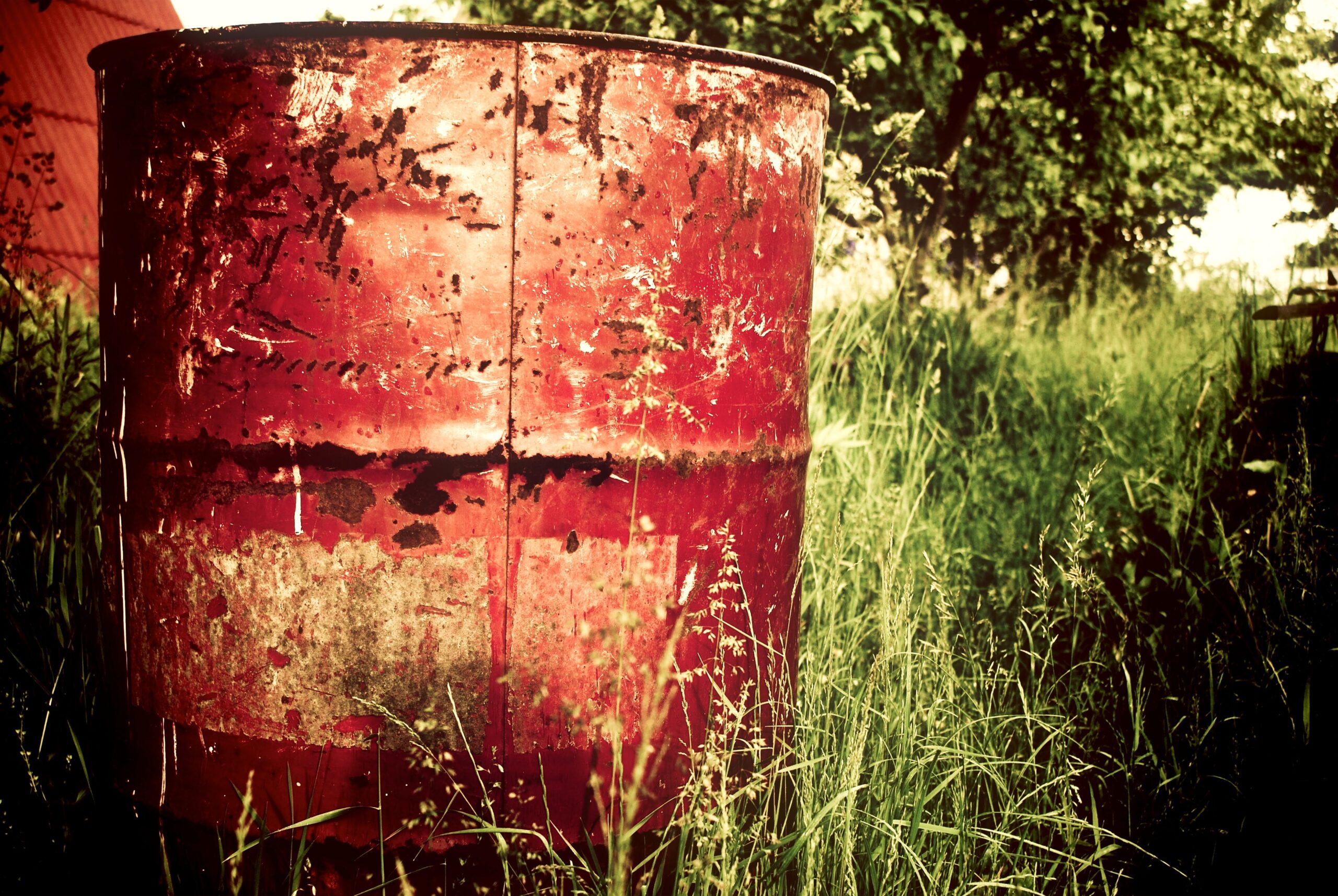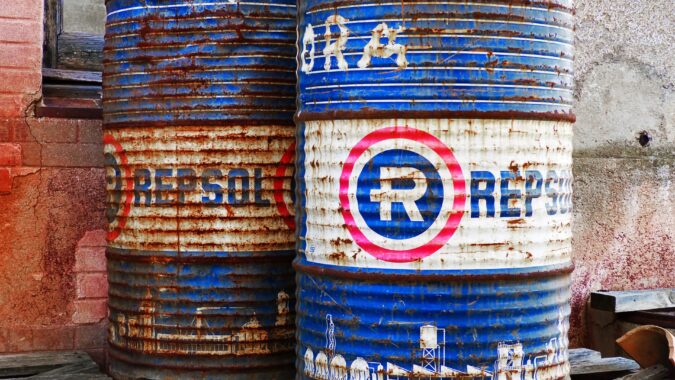
Waste Oil Collection
Waste oil disposal is vital for businesses that produce everything from waste diesel to used motor and cooking oil. Waste oil collection can save your organisation money, help protect the environment, and provide you with the peace of mind that you’re fully compliant with relevant UK regulations. Arrange waste oil removal with Business Waste today.
UK law requires all organisations with waste oil to store and dispose of it in a safe and correct manner. We can provide your business with free waste oil containers, regular collections, safe oil waste disposal and recycling – you just pay for collection. Call 0800 211 8390 or contact us online for a free quote and to arrange collection for your business, from any location in the UK.
Fast, Free Quotation
Get a fast FREE quote for your oil waste removal
- Free quote within 1 hr
- Any type of oil waste
- FREE bins and delivery
- We cover all of the UK
Contents
Oil waste
removal
Arrange collection of waste oil from your business whatever your industry and wherever you’re based in the UK. Tell us the type and amount of waste you have, and we’ll deliver appropriate free waste oil containers. Simply fill them up, store safely, move to an accessible pickup point and pay for collection.
Make sure any waste oil tank, drum, or container is filled within the weight limits to avoid overweight charges – and with only one type of oil. Our waste oil collection provides you with peace of mind that your used oil is removed, recycled, and reused in as safe, legal, and eco-friendly way as possible.
Waste oil collection prices vary depending on the type and amount of oil waste you need removing, and how often you require collection. Schedule pickup of your oil waste as a one-off or daily, weekly, or fortnightly if your business produces a lot or little amount of waste oil.
Call us today on 0800 211 8390 and speak to one of our friendly team about our oil removal services. Or fill in an online contact form and one of our experts will get back to you. Get a free quote for waste oil removal from your business today.
Oil waste
containers and drums
At Business Waste, we can provide you with a range of waste oil storage solutions. These include oil waste containers, drums, tanks, and barrels. The type of waste oil container you need will depend on:
- The type of oil you want to dispose of
- How much waste oil you produce
- How often you need used oil collection
All oil waste containers are specifically tailored to your individual needs. You must ensure each container is clearly labelled, to avoid cross-contamination. Ensuring your waste oil is safely stored, collected, and disposed of, helps protect the environment and promote a greener future. Explore a range of drums, tanks, containers, and more for disposing of oil waste.
Waste engine
oil collection
Waste engine oil is one of the main types of oil waste many businesses produce. Garages, construction sites, factories, and any business that uses vehicles and heavy machinery will end up with old, contaminated, and waste engine oil. Disposing of motor oil efficiently, legally, and in an environmentally friendly way is vital.
Our licensed waste carriers can collect all types of waste engine oil, such as:
- Hydraulic oil
- Brake fluids
- Transmission oil
- Gearbox oil
- Mineral oils
We can provide free barrels, drums, and containers in various sizes to store your old motor oil safely and avoid contamination. You simply pay for waste engine oil collection near you.
Most engine oil is sent for recycling near you at an appropriate waste management facility. Old engine oil is recycled and refined into new motor oil, lubricants, fuel oil, or raw materials. This follows a process of dewatering, filtering, propane de-asphalting, and distilling.
Contact us to arrange waste engine oil collection and recycling for your business.
Who needs
waste oil disposal?
Many industries and businesses use oil to keep their operations running smoothly. From motor oil that keeps engines whirring, to cooking oil in the kitchens of pubs, restaurants, and takeaways, it’s an essential component for many companies. Once it’s used or contaminated and no longer usable, these businesses need to dispose of such oil in the correct way.
Some of the main industries that require waste oil removal include:
- Airports – engine oil from aircraft, vehicles on the ground, and other machinery
- Automotive – waste motor oil that arises when repairing cars and motorbikes
- Construction – lubricating oil for machinery and waste motor oil from vehicles
- Factories – diesel, gas, and other waste oil to keep machinery running
- Kitchens – used cooking oil from machinery such as deep fat fryers
Cooking oil
recycling
Waste cooking oil can be recycled but not with food waste. Store any leftover or used cooking oil in a secure container and arrange oil collection by a licensed waste carrier from your commercial kitchen, restaurant, or any other food-related business. Recycling is possible for any vegetable, olive, frying, and other types of cooking oil.
For domestic cooking oil, some household waste recycling centres (HWRCs) also offer cooking oil recycling. Store it separately from other food and oil waste then check if your local HWRC accepts cooking oil for recycling. The cooking oil recycling process for domestic and commercial waste involves the old oil being graded, sieved, filtered, and converted into biodiesel.
Waste oil disposal
laws and regulations
There are numerous legislations designed to ensure businesses store and dispose of waste oil safely. Three of the main ones are:
Hazardous Waste Regulations 2005
Non-edible oils class as hazardous waste. This means you must comply with the Hazardous Waste Regulations act when you dispose of oil. The legislation dictates that anybody who uses or produces hazardous waste for commercial purposes must ensure it’s stored safely and securely, using appropriate containers.
Every oil waste container you use has to be clearly labelled to avoid cross-contamination and must only be collected by a licensed carrier. Each time you transfer waste oil, you should keep a ‘Duty of Care’ certificate or ‘Waste Transfer Note’ to demonstrate that it was disposed of safely.
The Control of Pollution (Oil Storage) (England) Regulations 2001
This legislation was put into place to ensure business owners store their oil safely and securely. However, it only comes into fruition if you store more than 201 litres of oil at once. Therefore, businesses with only a small amount of waste oil are exempt.
It provides guidance on safe storage and dictates that qualified personnel install it. According to the government, this means they must pass the ‘Competent Person Scheme’. Additionally, your oil waste containers should be checked annually.
Environmental Protection Act 1990
The Environmental Protection Act 1990 was introduced to protect the environment for future generations. It’s often referenced regarding waste disposal. As a business owner, you have a ‘duty of care’ to ensure your impact upon the environment is minimal.
To achieve this, you must prevent the ‘unauthorised or harmful deposit, treatment or disposal of waste.’ This means storing oil waste securely, and ensuring a licensed carrier collects it. You must also complete an accurate waste transfer note each time waste oil is collected.

How does waste
oil collection work?
-
Select your free bins
It’s quick and easy to organise commercial waste collection for your business.
Simply start by telling us the:
- Type of waste you need removing
- Size of bins you require
- Number of bins you want
We’ll provide you with a free quote.
-
Arrange delivery
When you’re happy with the type, number, and size of free bins, tell us when you need your bins delivering.
Let us know about any access issues where you want the bins delivering – such as locked gates, access codes and times. We’ll get you up and running in no time.
-
Fill up your bin
After the free bins arrive at your chosen location, fill them up with the agreed waste type.
Make sure you remain within any weight limits for the specific waste type and bin size.
-
Get your business waste collected
We’ll arrange waste collection at a time and frequency to suit you and the amount of waste you have.
As featured in…
What is
waste oil?
Waste oil is that refined from crude oil or any synthetic oil that has been used and/or become contaminated by physical or chemical impurities. Contamination can happen through its intended use by known hazards or its ingredients. Except for cooking oil, waste oil can be hazardous to human health and the environment.
The Control of Substances Hazardous to Health 2002 (COSHH) means it’s a criminal offence in the UK to dispose of waste oil without an approved provider. Breaching these regulations with improper control over your waste oil can lead to severe consequences. Our professional waste management services can provide you with peace of mind that you’re protecting your organisation and the environment.
Some of the main types of waste oil we can collect are:
- Diesel and gas oil
- Used and waste cooking oil
- Lubricating oil
- Medium and light fuel oils
- Electrical insulation oil
- Kerosene
- Gearbox oil
- Waste engine oil
- Waste motor oil
Waste oil
recycling
Oil recycling follows many different stages, and the process varies slightly depending upon the type of oil. After the collection of waste oil from your business, it’s transported to a recycling facility. Here the most common process for recycling oil follows these three steps:
- Dewatering
As the name suggests, the first stage removes water from the waste oil being recycled. This process is relatively straightforward and involves separating the oil from any water before anything else is done to it.
- Filtering
After dewatering, the next step of oil recycling is filtering. This process aims to remove any additives or inorganic material from the waste oil. For example, if you’re recycling diesel, it may contain an anti-corrosion agent that needs extracting. After the filtering stage, the waste oil will be cleaner before it’s refined.
- Distilling
Distillation separates the different components within the oil. This process is achieved by boiling the oil. After the distillation process, the refined oil can be used again, as good as new. It may also be hydrotreated to ensure the oil is completely pure. Hydrotreatment removes excess oxygen, nitrogen, sulphur, and chlorine from the oil.
Recycled oil can be used to create eco-friendly biodiesel. Alternatively, waste oil might be used as a power source. To do this the oil must be burnt though, which can damage the environment by releasing toxic gases into the atmosphere – and it means the oil can’t be used again.
Waste oil
disposal
For disposal of oil, it’s important that you store it separately in relevant drums, barrels, or containers for collection. Other than cooking and edible oil, it often classes as hazardous waste, so safe disposal is essential to protect both human and environmental health. It’s commonly dewatered, filtered, and distilled for reuse.
You cannot pour any waste oil down the drain for disposal, as it can pollute rivers, groundwater, and land. Businesses must use licensed waste carriers for their waste oil disposal. Households may be able to dispose of small amounts of oil in your domestic waste collections in a clearly labelled container – though check with your local authority first.
How to
dispose of oil
If stored incorrectly, waste oil can cause serious damage to the environment and human health. For example, if you try to dispose of oil down the drain, it will eventually end up in our water (lakes, rivers, or the ocean). In water, oil creates a thin film across the surface. This can cause severe damage to marine and plant life, alongside polluting our water sources.
Pouring cooking and other oils down the drain also forms fatbergs, which block important water and sewage pipes, creating all sorts of problems. Unsecure waste oil storage can also cause leaks or spills. This can have profound implications on the environment and poses a considerable health and safety risk in your workplace.
To dispose of oil, you need to have safe and secure waste oil storage in place. Especially as many types of oil waste are hazardous, it needs putting in an oil waste container that’s not damaged and has a secure lid. Store your waste oil drums, containers, or tanks in a dry area that’s secure and safe from vandalism and flood risks.
Don’t mix waste oil types into one container. Separate your waste oil storage to avoid additional contamination, making it easier to recycle. Then arrange for licensed oil collectors to pick up your containers, drums, or tanks of waste oil and transport to an appropriate treatment and recycling facility near you for proper disposal.
Grease recycling
prices
Waste cooking oil is a valuable commodity. The market is still fairly new but used cooking and vegetable oil can be collected, cleaned, and turned into renewable and environmentally friendly fuel such as biodiesel. For this reason, there’s a market for businesses producing waste cooking oil – rather than disposing of it.
Grease recycling prices are constantly changing based on supply and demand. Most places that offer to buy waste grease, cooking, or vegetable oil, set their prices in line with the volume and type of waste oil. If you run a kitchen, catering company, or any other business generating lots of used cooking oil, looking into the current grease recycling prices and ways to sell could be financially rewarding for your organisation.
Oil waste
facts
A staggering 1.7 billion litres (380 million gallons) of waste oil is recycled across the world every year. This includes everything from petrol and diesel to motor oil and lubricating oil sent for recycling. Sadly, around 900 million litres (200 million gallons) of used oil are improperly disposed of annually though. Re-refining used oil requires around one third of the energy of refining crude oil to lubricant quality.
The cooking oil recycling market in the UK is valued at around £63 million in 2022. In the USA, the market value is much higher but there’s also around $75 million worth of grease theft in the States every year. This shows how valuable the market for waste cooking and vegetable oil is.

Read our reviews
James was very helpful and to be honest since starting with this company the service has been excellent.Christeen Norfolk
Waste oil
FAQs
-
What’s the difference between waste oil and used oil?
Waste and used oil are terms often used to refer to the same thing – oil that you can no longer use for its initial purpose. There’s some overlap between the two, as used oil classes as waste, although waste oil isn’t necessarily always used. To clear things up, these are the main differences between waste and used oil:
- Used oil – oil that’s served its purpose and been used, which now contains chemical or physical contaminants. Examples include waste engine oil from vehicles after being driven.
- Waste oil – oil that hasn’t been used but can’t serve its intended purpose. Often this is because it also contains contaminants, such as if water or other chemicals have leaked into an oil drum. Therefore, it must be disposed.
-
Can you get paid for waste oil?
Yes, for certain types of oil waste – normally used cooking oil, vegetable oil, or grease – you can sometimes get paid for it. This still requires safe and legal waste oil storage and removal to a certified facility, where they will clean and transform the likes of cooking oil into biofuel.
The amount you could earn depends on the type and amount of oil you have to sell. You can’t normally get paid for waste hazardous oil though, such as engine, motor, and lubricant oil. Instead, arrange for authorised oil collectors to remove this from your business premises.
-
What can waste oil be used for?
Waste oil can be used for a variety of purposes depending on its type. After being dewatered, filtered, and distilled, waste oil can be:
- Reused in motorised equipment
- Turned into hydraulic oil
- Used for making plastics
- Converted into biofuel
- Mixed with new fuel oil for use in boilers
-
Are waste oil burners legal?
Using a waste oil burner is legal in the UK but your business must have a permit – according to Schedule 13A of the Environmental Permitting Regulations 2010. There’s an application and annual charge to obtain such a permit. Depending on your intended use it may be more cost-effective to arrange waste oil removal instead.
-
Why is waste oil hazardous?
Aside from used cooking oil, most non-edible oil waste is generally considered hazardous. This is because it can be harmful to both the environment and human health when not disposed of properly, as it can contain volatile liquid hydrocarbons, nitrogen, sulphur, and other potentially dangerous elements.
Oil waste may also pick up other contaminants whether it’s used or not. Just one litre of waste oil can contaminate a million litres of water according to the European Commission. For these reasons it’s essential you arrange proper disposal of your oil and hazardous waste.
Get your free oil waste collection quote
Get a fast FREE quote for oil waste removal
- Free quote within 1 hr
- Any type of waste oil
- FREE bins and delivery
- We cover all of the UK